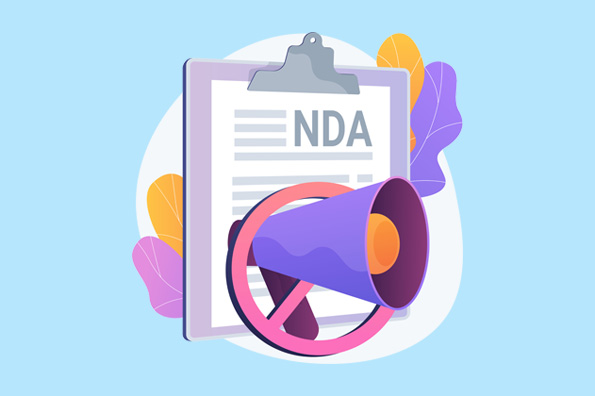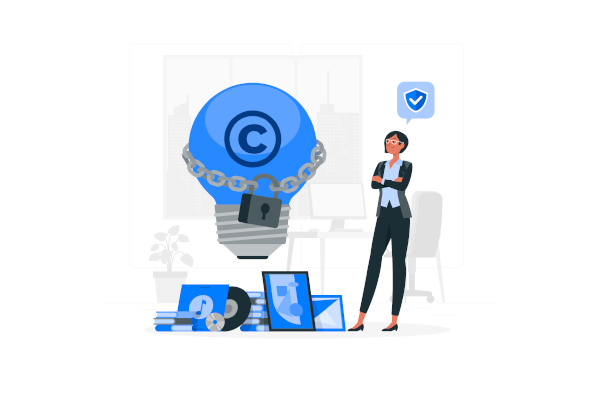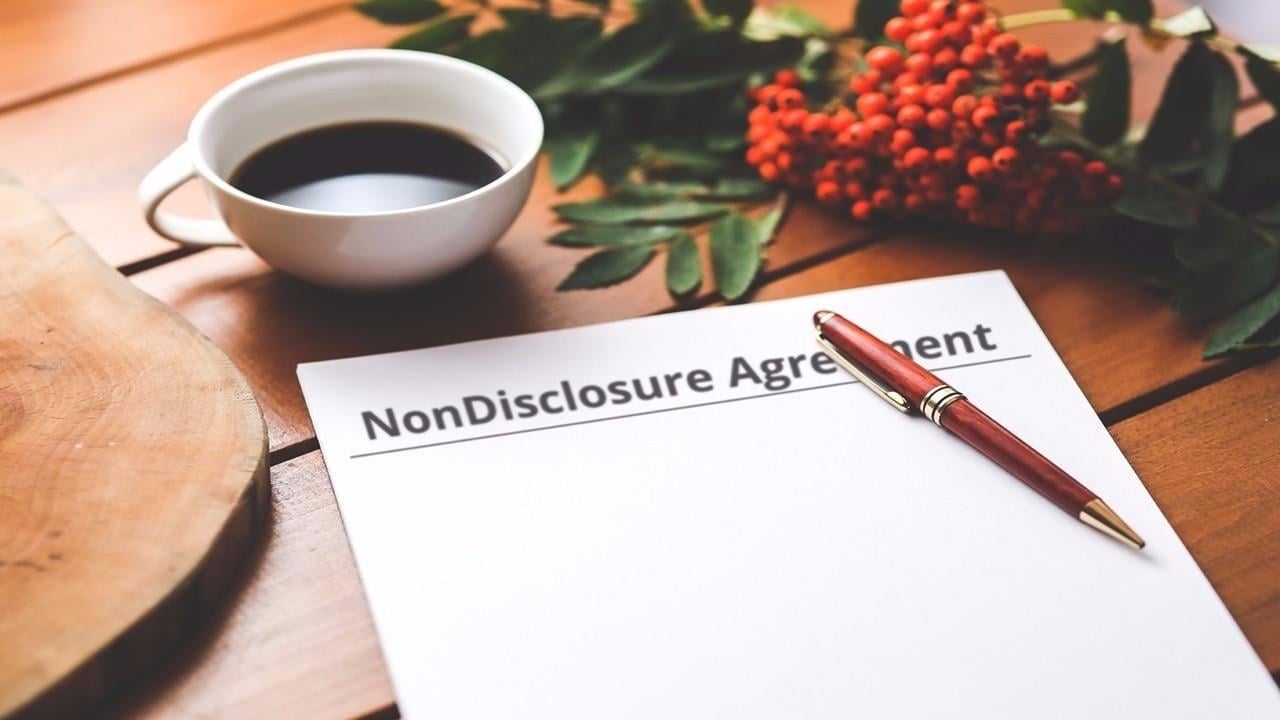Why NDAs Are Essential for Protecting Confidential Info with Third Parties
When you're sharing sensitive information, it's crucial to have the recipient sign a Non-Disclosure Agreement (NDA) before you share anything. While...
7 min read
 Chris Daming, J.D., LL.M.
:
Jul. 31, 2024
Chris Daming, J.D., LL.M.
:
Jul. 31, 2024
If your company has valuable information that you wouldn’t want a competitor to possess, chances are it could be considered a trade secret. To understand how your company can protect those valuable trade secrets, first it’s important to understand what qualifies.


Legal GPS Pro
Protect your business with our complete legal subscription service, designed by top startup attorneys.
Trade secrets consist of information that can include a formula, pattern, compilation, program, device, method, technique or process. To meet the most common definition of a trade secret, it must be used in business, and give an opportunity to obtain an economic advantage over competitors who do not know the information or use it.
So we’ve covered the basics of what information is considered a trade secret. Beyond that, the information has to meet three requirements to be considered a trade secret by the courts. “By the courts” is important because in order to enforce your rights over the trade secret, you’ll need to go to court.
Your information has to give you an economic advantage because of the fact that you’re the only one who knows it.
To test this, imagine if everyone had that information, would you be able to keep your advantage or no? If you would - then its value is not in being secret. A good example is a secret ingredient or a secret recipe. It gives you an advantage because you’re the only one who can make it. If everyone knew how to make the secret dish exactly like you do it - then you lose your economic advantage.
The recipe for Coke (the soda sold by Coca-Cola) is a trade secret. Companies try to reverse-engineer it and produce generic versions, but only a few people in the world know the entire recipe. If everyone knew the recipe, Coke sales would plummet.

Nondisclosure Agreement
Safeguard confidential information with our Non-Disclosure Agreement Template.
Trusted by 1,000+ businesses to safeguard their LLCs.
It should not be readily known or “knowable” by others: the information shouldn’t be readily available. If some people know about it or can find it relatively easily, then it’s “readily known” or “knowable” so won’t constitute a trade secret. (this ties into the last element -- if the information was readily known, chances are it wouldn’t have economic value anyway).
Finally, you have to take steps to protect your trade secret. You need to protect it from people finding it out easily--both physically and legally (by “legally” - we mean, using NDAs and only sharing on “need-to-know basis”).
Safeguard Your Startup With Nondisclosure Agreements
If you've discovered that your information is eligible for trade secret protection, the next step is to do the trade secret v. patent analysis. Oversimplified, you want to ask yourself:
If your advantage of having the info confidential lasts a long-time, is almost impossible to reverse engineer, and/or you have a very limited budget, trade secrets might make more sense. If otherwise, sometimes patents are the right call.
Assuming trade secrets make more sense, you'll next want to ensure you take proper steps to maintain the information's confidentiality.


Legal GPS Pro
Protect your business with our complete legal subscription service, designed by top startup attorneys.
The first thing to do is to make sure your info is physically protected. For example, if you’re in a shared office (where not everyone around you is bound by confidentiality), you can’t leave it out on your desk. It needs to be locked up.
Is your info on a computer? That computer should be locked up—both with a password and physically. If you left your laptop at a coffee shop and someone stole the trade secret from it, a judge might say you didn’t protect the information adequately, so it won’t get the trade secret protection. (if you had a password on your laptop, it’d be surprising if that weren’t enough precautionary measures, though).
This being said, if you have it locked up and someone breaks into your home, I would be shocked if someone said you weren’t protecting it enough physically. Obviously there are limitations to what you need to do—it’s not like you have to build a nuclear-bomb-protected vault to protect it. But it should be under some type of “lock and key.”
You also should also share the information with people bound by confidentiality through an NDA.
You might be wondering--how do I show this information to people like my employees or to investors? That’s when non-disclosure agreements, or NDAs, make sense. An NDA is just a contract between two parties that says that someone is giving another person some info, and the person receiving the info can’t share it with others.
These are extremely important and must be used if you want to keep your trade secret status. Use them anytime you’re telling someone the secret info. This being said, there’s one big caveat to keep in mind. Investors typically won’t sign NDAs just to find out some background about your company. If you asked them to sign one in your first meeting with them, it could make you look bad.
One easy way to think about what you can say to investors or others is to just imagine what are some basic details about your product. That stuff’s not confidential. If everything about your product, including your pitch, is confidential, you’re probably overdoing the whole confidentiality thing.
Of course, if the investor becomes more interested and you have to give them important info as part of due diligence, that’s probably the time to get the NDA signed. Do some background research on the investor and find out what their policy is for NDAs and when they’ll usually agree to them.


Legal GPS Pro
Protect your business with our complete legal subscription service, designed by top startup attorneys.
In terms of how to handle giving out information, you should do it on a “need to know” basis. First, if you have to give someone access to certain information, only give them access to the information they need. Coca Cola is an extreme example of a company that does this. Their recipe for coke is supposedly only known by two employees at a time.
You can do similar things with your company. Figure out what’s the minimum amount of information you have to disclose, and disclose that and no more.
For example, if you have a tech company with trade secrets surrounding your software code, chances are that your sales force won’t need to know the details of that code. Just as your developers don’t necessarily need to know the sales group’s customer lists.
Besides limiting the actual info you give out, you should also limit the number of people you give that info to. In other words, who on your team needs to know confidential information. Don’t go out of your way to give out the info just because the person is an employee.
Here’s a good practice--once you’ve established who needs to know confidential info and have had those people sign NDAs, create a “need to know” spreadsheet. The sheet would say who the people are that you gave the info to. And it’d also say the date the people signed an NDA, the terms of the NDA, and whether they returned all property once the NDA term was over. This is great to show investors because it indicates you’re serious about protecting your IP.
You should also mark your trade secret documents as confidential. And you can include info that says the documents are part of a trade secret.
Make sure to specifically identify only the documents that are actually the confidential ones—you can’t just label every document you have as “confidential.” Doing that makes it easier for others to argue that you disclosed part of your trade secret and shouldn’t get trade secret protection. Like, for example, if you stamped “confidential” on a weather report, that’s almost never something that’s confidential.
As a refresher, to understand what’s important and should be confidential, figure out what information gives your business a competitive advantage. Some examples of information that qualifies as giving your business a competitive advantage are:
If it gives your company a competitive advantage, indicate that it’s confidential--either by marking as such, keeping it locked up, putting it in a folder (digital or physical) marked as confidential, or any other way so that both you and, more importantly, anyone else who has access to the information knows what is and isn’t confidential.
Here's a good example why that's a problem:
Will was developing the program for his sales automation system with his team. Wanting to protect the system as a trade secret before the program was launched, he had everyone in the company sign non-disclosure agreements. He wasn’t sure how to define the confidential information, so he decided to say everything on the company’s computers was confidential.
A month later Chet left the company to start his own. Chet had signed the NDA and also was privy to everything in the company. Chet set up an identical company. And Will sued Chet for stealing Will’s trade secret.
Unfortunately, Will had a hard time proving what information in the company was and wasn’t confidential. Chet’s lawyer brought the digital records of Will’s computer to court and asked Will if his weather report for his city was confidential? And if the webpages of espn.com were also confidential.
Because WIll never indicated what information was confidential, Chet prevailed in court. Will could’ve prevented all this by indicating what information was and wasn’t confidential.
Trade secrets aren't a common "lingo" for businesses but ironically, they apply to most owners. If you take these steps and use NDAs when you want to share information, you'll be in great shape!
The biggest question now is, "Do I need a lawyer for an NDA?” For most businesses and in most cases, you don't need a lawyer to start your business. Instead, many business owners rely on Legal GPS Pro to help with legal issues.
Legal GPS Pro is your All-In-One Legal Toolkit for Businesses. Developed by top startup attorneys, Pro gives you access to 100+ expertly crafted templates including operating agreements, NDAs, and service agreements, and an interactive platform. All designed to protect your company and set it up for lasting success.

Legal GPS Pro
Protect your business with our complete legal subscription service, designed by top startup attorneys.
|
Premium Template
Single-use Template |
Legal GPS Pro
Unlimited Access, Best Value |
|
|
| Choose Template | Learn More |
| Trusted by 1000+ businesses | |

When you're sharing sensitive information, it's crucial to have the recipient sign a Non-Disclosure Agreement (NDA) before you share anything. While...

Imagine this scenario: you’re trying to get another party to sign an NDA, but you’ve already disclosed confidential information to them. If that’s...

For your NDA, you have to define what information you’re declaring as “confidential.” And there’s a good reason for this -- imagine that your...